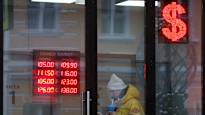MOSCOW The capital’s shopping centers are decorated and brightly lit as Russia prepares to celebrate the New Year. However, the festive mood is weighed down by everyday problems. The price of food in Russia has risen sharply, for some products up to tens of percent.
– I have noticed it clearly in the last month or two, Gevorg Ter-Alkimyan says in front of the Gagarinsky shopping center in Moscow.
He says that in general all products have become more expensive, starting with basic foodstuffs such as dairy products.
In Russia, we sometimes talk about the so-called Olivier index. To prepare Olivier salad, which is especially popular in the New Year, you need many basic foods such as potatoes, carrots, eggs and sausages or chicken.
Parlamentskaja Gazeta newspaper fatthat last year a salad for four people cost about 205 rubles, or just under two euros, and this year, 348 rubles, or more than three euros. The price rose by almost 70 percent.
The Russian Central Bank has estimated that Russian inflation would be 8–8.5 percent this year. The bank has struggled against inflation by raising its key interest rate to a whopping 21 percent. It may have to raise interest rates even more this year.
The central bank and the government are pulling in different directions
Inflation is difficult to control when it is fueled by the overheated military industry and the labor shortage that is plaguing Russia.
– On the one hand, the central bank tries to withdraw money from the economy, on the other hand, the government and the Ministry of Finance push money into the economy. These opposite developments lead to the fact that inflation will not subside, the economist Nikolai Kulbaka said to .
Kulbaka says that without the central bank’s actions, the situation would be even worse.
The central bank is trying to prevent inflation from going wild. However, the Russian business elite has begun to criticize the head of the central bank Elvira Nabiullinaa freezing the country’s economy.
Association of Shopping Centers warnsthat already a thousand shopping centers are threatened with bankruptcy due to the central bank’s strict interest rate policy.
– It is clear that a huge number of lobbyists are fighting against the central bank, but it has still been able to hold its own. I don’t know how long it will take, says Kulbaka.
Stagflation is knocking on the door
So far, the Russian economy has survived the Western sanctions better than many experts expected. Last year the economy grew by 3.6 percent, this year the growth expectations are similar.
Now, however, many economists see signs of slowing growth and warn of stagflation. It means a very difficult situation, which combines slow economic growth and high inflation.
Nikolai Kulbaka says that the situation in Russia would be different from stagflation in Western Europe in the 1970s. Stagflation at that time was accompanied by widespread unemployment, but in practice full employment prevails in Russia.
Sending men to the front and fleeing the country have exacerbated the labor shortage, but Russia would have encountered that problem anyway, as the number of the working-age population is decreasing.
The gap cannot be filled with students and retirees, and many countries other than Russia are already competing for Central Asian migrant workers.
The drop in the exchange rate of the ruble increases imports
On Wednesday, the value of the ruble fell sharply against the dollar and the euro. The central bank announced that it will suspend purchases of foreign currencies in the Russian domestic market.
According to Nikolai Kulbaka, the weakening of the exchange rate was expected.
The trigger for the price drop was the sanctions imposed by the US on the important Russian bank Gazprombank. The bank was the last legal channel to handle currency transactions.
Now Russia has to look for workarounds again. There is a shortage of foreign currencies, and their demand has increased. Detours, on the other hand, increase costs and cause delays in payments.
The Minister of Finance Anton Siluanov has on the other hand said that a weak ruble will promote Russian exports.
Russians are used to inflation
Inflation is unlikely to cause any major upheavals yet. Russians are used to rising prices.
– The first inflation I personally experienced was in the early 90s. Then came the crises of 1998 and 2008 and so on, Muscovite Julija Shchedrina says by the Gagarinsky shopping center.
– But what to do? That’s the modern situation. Times cannot be chosen, we live and die in them. I choose to live, carefree and joyful.
Director of the Levada center, which specializes in opinion polls Denis Volkov says that the current inflation cannot be described as catastrophic.
– Prices are always rising, the government tries to stabilize them and take them into account in the pension indices and public sector employee salaries, Volkov describes.
News about exchange rate fluctuations doesn’t have a very strong effect on mood either, because only 20 percent of Russians follow exchange rates with some degree of accuracy, says Volkov.
In Levada’s measurements, economic sentiments were at their peak in March at the time of the presidential election, when those in power handed out promises and money. After that, citizens’ assessments of the economy fell somewhat until mid-autumn, when the mood improved again.
Right now, the majority of Russians think that there is no reason to make large-scale purchases at this time. It could be a sign that the central bank’s interest rate hike is starting to work.
